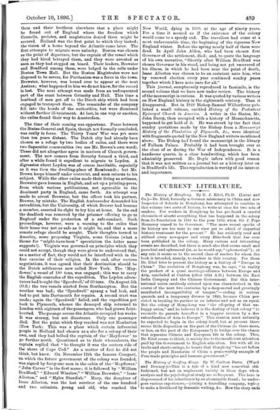CURRENT LITERATURE.
The History of Hongkong. By E. J. Eitel, Ph.D. (Luzac and Co.)—Dr. Eitel, formerly a German missionary in China and now Inspector of Schools in Hongkong, has attempted to combine in this volume two sorts of history, to write at once for two sets of readers. For readers in Hongkong he has produced a careful chronicle of almdst everything that has happened in the colony from its foundation in 1841 to the year 1882, when Sir J. Pope Hennessy ceased to be Governor. "The more recent epochs of its history are too near to our view yet to admit of impartial historic treatment for the present." He has evidently read and utilised every newspaper and every Blue-book that has ever been published in the colony. Many curious and interesting events are described, but there is much also that seems small and parochial and ephemeral (or, as he would say, " ephemerical"); at any rate it seems so to the second class of readers for whom the book is intended, namely, to readers in this country. For them Dr. Eitel tries to present the history as a history of "Europe in China." The evolution of Hongkong was, he says, " in reality the product of a quasi marriage-alliance between Europe and Asia, concluded at Canton (after 1634 A.D.) between the East India Company and the Chinese Government. But this inter- national union carelessly entered upon was characterised in the course of the next two centuries by a deep-seated and growingly manifested incompatibility of temper,"— ending in serious quarrels and a temporary divorce in 1839, because China per- sisted in treating its partner as an inferior and not as an equal. But the colony of Hong-kong was " the offspring of that un- happy union," and he believes it is the destiny of that colony "to reconcile its parents hereafter in a happier reunion by a due subordination of Asia to Europe." This reunion must naturally be expected to begin in the colony itself, but at present there seems little disposition on the part of the Chinese (is there more, or less, on the part of the Europeans ?) to bridge over the chasm that separates Chinese and European life in the colony. This, Dr. Eitel seems to think, is mainly due to the insufficient attention paid by the Government to English education. But with all its faults and shortcomings, he boasts that Hongkong " has set before the people and Mandarins of China a praiseworthy example of Free-trade principles and humane government."


















































 Previous page
Previous page